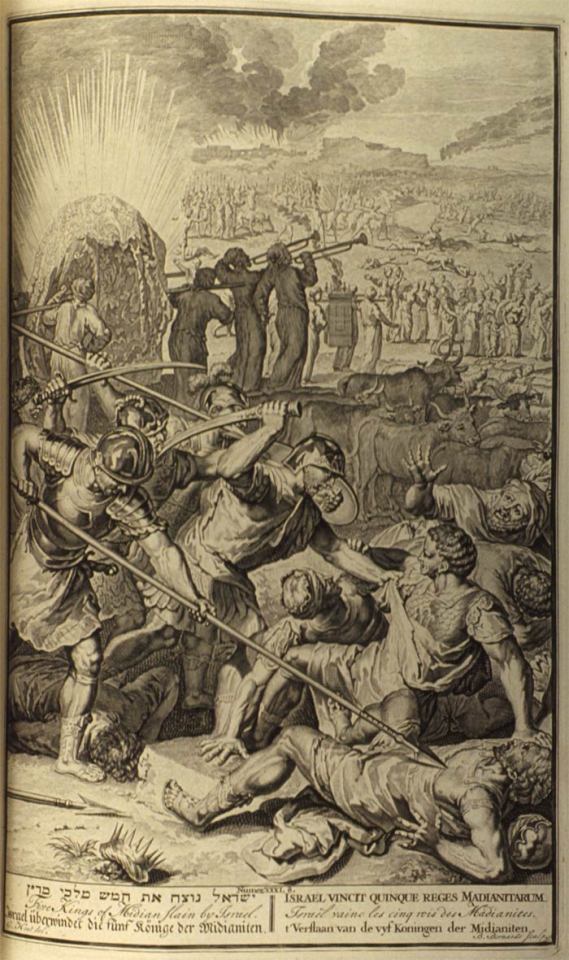#mattot-massay
Text
Mattot-Masay: The Midianite Tragedy, and Us

The LORD spoke to Moses, saying, “Avenge the Israelite people on the Midianites.” Moses spoke to the people, saying, “Let men fall upon Midian to wreak the Lord’s vengeance.” [The Israelite warriors] fell upon Midian, and slew every male, including male children, and [afterwards] slew every married woman. And they took much booty, for the priests and the Lord.
--Num. 31:1-18 (adapted)
There are many scapegoats for our sins, but the most popular one is Providence.
--Mark Twain, 1898
Why is this portion of Torah so war-mongering, and so bloody? Rabbi Michael Lerner, Ph.D, writes of “A Torah of Love and a Torah of Hate,” and this is clearly an example of the latter.
Who wrote the Torah? Why, Moses, clearly and without a doubt. This was, and is, the Traditional viewpoint, embraced today by only the Orthodox. Perhaps, however, the Documentary Hypothesis has crept in among them, as well: I recall participating in the very first class on Scientific Bible Criticism to ever be taught at Yeshiva University, my long-ago alma mater. According to this school of thought, it was a Kohen, a Priest, who wrote the Book of Numbers, which we are shortly concluding. Scholars call him P, for obvious reasons.
There were other authors, listed in many a book of Biblical scholarship: J, E, D, and others. Each had a particular style and language. There was also P.
The question, according to James Kugel, Ph.D, in his How to Read the Bible (2007, pp. 299-306), is, when did P live? Dr. Kugel, of Harvard University and currently Emeritus at Bar-Ilan University (and who identifies as Orthodox), explains that the older scholarly opinion was that P was post-exilic. P was well aware of the Destruction of the First Temple, and the Israelites’ being kidnapped to Babylonia.
Following Babylon’s defeat by the Persians, the victors allowed the Israelites to return to Israel. Significantly, most of them did not. Think of the paltry number of American Jews who moved to Israel following its independence; American fleshpots were more tempting than a Spartanlike kibbutz. More recently, it is believed by several of them that P actually lived in the pre-exilic period, when the tiny kingdom of Judah was threatened, both within and without.
Against these sad and tragic backgrounds, P, possibly a Priest without a temple, wrote the Book of Numbers. Which returns to my central question: why is Mattot-Massay so bloody? Why the massacres of Midianite prisoners, and the acts of looting, all on the tired excuse that Midian and Peor enticed the people to idolatry? I cannot excuse the violence, but I believe that P was trying to harken back to a period when his nation was powerful, rather than refugees at the hands of Babylon and Persia. It is inexcusable, by our modern standards, that the bloody tales of these Torah portions were inflated and aggrandized. Well, yes: but please note that various nations, the US chief among them, possess sufficient nuclear missiles to annihilate humanity more than five times over. Note also that our nation is top among arms merchants to the world; in various Third World countries, a submachine gun is cheaper than a loaf of bread.
In the end, what remains? I hold with Rabbi Lerner’s comment: our Book contains both love and hatred. It is left to us to comprehend the difference, and, in spite of our tragic past, endeavor to work for a peaceful humankind.
______________________________________________________________
Rabbi David Hartley Mark is from New York City’s Lower East Side. He attended Yeshiva University, the City University of NY Graduate Center for English Literature, and received semicha at the Academy for Jewish Religion. He currently teaches English at Everglades University in Boca Raton, FL, and has a Shabbat pulpit at Temple Sholom of Pompano Beach. His literary tastes run to Isaac Bashevis Singer, Stephen King, King David, Kohelet, Christopher Marlowe, and the Harlem Renaissance.
#progressive judaism#judaism#jewish#parsha#weekly parsha#drash#rabbi david hartley mark#shabbat#shabbos#sabbath#torah study#matot-masei#mattot-massay#oneshul#shabbat shalom
3 notes
·
View notes
Link
Mattot-Masay: The Midianite Tragedy, and Us by Rabbi David Hartley Mark The LORD spoke to Moses, saying, “Avenge the Israelite peop...
0 notes